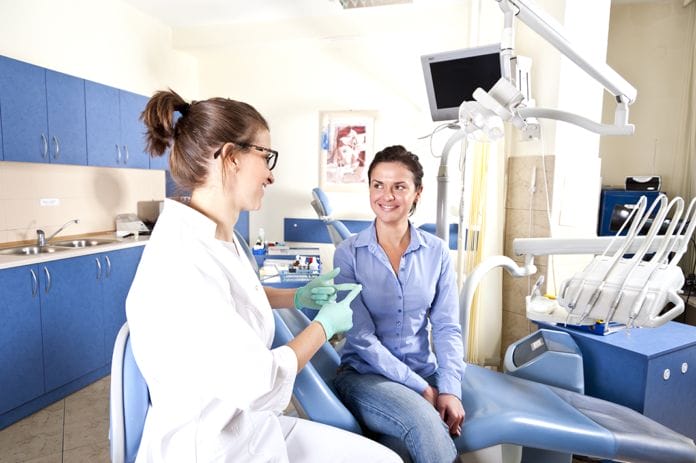There are many misconceptions regarding oral hygiene and the mouth that some of our patients believe to be true. With a large amount of false information found online, it’s no wonder our patients can be easily led in the wrong direction when it comes to oral health.
It’s always important to remember that just because you read something online, doesn’t mean it’s true, fact-based or accurate. The following are five myths about the mouth that need to be set straight.
Bleeding gums are normal
You’d be worried if when you washed your hands, they bled, right!? The same logic applies to your mouth and gums. If you notice that your gums are bleeding, it isn’t just because your gums are a little fragile. This bleeding is actually the first sign of infection, an infection that is caused by bacteria. The plaque that gives you that fuzzy feeling on your teeth is full of this disease-causing bacteria.
Even if you brush well, there’s still about 1/3 of your tooth surface that a toothbrush simply cannot reach and 1/3 of bacteria left to grow. When this bacteria is left undisturbed, it not only grows in numbers, but it gets stronger, which can lead to the destruction of the structures that hold your teeth in place, including bone, ligaments, and gingival tissue.
This is why it’s so important to clean in between your teeth, beyond just brushing alone. Not only can these accumulating bacteria lead to an infection that could potentially destroy the underlying bone and tissues holding your teeth in, but it can also harden into calculus (tartar). Once it has hardened, or calcified, only a dental hygienist with specialized training and instruments, can remove it. Regular dental appointments are more than just checking for cavities!
String floss is the only way to properly clean in between your teeth
There are many options when it comes to cleaning in between your teeth. For some, string floss actually isn’t even the most effective. Water flossers, the many sizes of interproximal (in-between) brushes, or another type of floss aide might be a better option depending on your oral health status, dexterity, and needs.
If you are unsure what option is best for you, your dental hygienist can help you with that! They not only can help find the best way to clean in between your teeth but can show you how to do it properly based on the certain method. What’s the best way to floss your teeth? Whichever way works for you, that you will do, correctly!
If your teeth don’t hurt, they are healthy
In the beginning stages, oral problems like cavities and gum disease, don’t start hurting until they have progressed to a more serious problem. Once you are in pain, it can mean the treatment you need may be extensive and expensive.
As an example, dental decay (cavities) don’t tend to hurt until the decay has reached the center of the tooth where the nerves are. Here, a simple filling probably won’t fix the problem. You may need a root canal and crown if the tooth can be saved at all and doesn’t need to be extracted (pulled out). Detecting problems early with regular dental visits and X-rays can help you avoid a situation like this.
Your oral health has no impact on your overall health
To put it simply, your mouth is connected to your body even though dentistry and the medical community seem to be separated in our society. Many diseases show the first signs and symptoms in your mouth before they show anywhere in or on your body. Examples of this are some autoimmune diseases and HIV. Further, you swallow the bacteria that’s in your mouth all day, every single day.
If you have inflammation and gum disease, the bacteria that is causing inflammation and infection in your mouth can be affecting other organs in your body. There’s research emerging all the time that shows links of the bacteria in your mouth contributing to increased stroke risk, heart disease, rheumatoid arthritis, trouble controlling blood sugar levels in diabetes, low birth weight/pre-term babies, Alzheimer’s disease, and many types of cancers. Having inflammation and infection in your mouth hurts more than just your teeth and gums, it can lead to health issues for your body.
Dental decay (cavities) are due to babies stealing calcium from a mom’s teeth
This old wives’ tale just won’t go away! Dental decay and gum disease are bacterial infections. Pregnancy and your baby alone doesn’t cause infections in your mouth. Your oral condition can take a hit due to pregnancy because of hormonal changes, morning sickness, acid reflux, saliva flow and/or consistency changes, and frequent snacking or eating habit changes. Pregnancy gingivitis is one example of hormonal changes due to pregnancy.
Practicing thorough homecare including brushing twice per day for two full minutes and cleaning in between your teeth at least once per day can help avoid pregnancy gingivitis. Visiting your dental hygienist more frequently during pregnancy can help too. Saliva helps keep your mouth at a neutral pH, so if your saliva changes during pregnancy, you can be more prone to cavities because acids can break down the enamel on teeth. Having excellent homecare including brushing and flossing thoroughly and regularly can help with this just as it can for pregnancy gingivitis. Your hygienist can recommend products that can help with this like remineralization products, prescription-strength fluoride toothpaste or take-home fluoride trays.
Just as how saliva changes can make your mouth more acidic so can morning sickness and acid reflux. The acid can erode the enamel on your teeth leaving you cavity-prone. It sounds odd, but don’t brush your teeth right after throwing up. You can rinse your mouth with a mixture of baking soda and water or wait at least 30 minutes to brush your teeth.
Whether you are pregnant or not, snacking and eating sugar-loaded or high carbohydrate foods can lead to cavities. The bacteria that cause cavities (and gum disease) feed on the same sugar you eat. After they eat this sugar, they excrete, or to be blunt they poop acid as a by-product, which causes dental decay. Yes, pregnancy can lead to oral health issues, but your sweet baby isn’t stealing the calcium from your teeth causing cavities!












